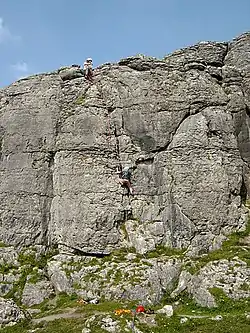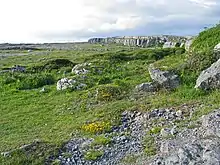Ballyryan
Ballyryan or Ballyreen (Irish: Baile Uí Rinn; Ring's homestead) is a small inland mostly west-facing limestone crag in The Burren in County Clare, Ireland. It is popular with rock climbers due to its easy access, the range of short easy-to-intermediate rock climbs, and its close proximity to the much larger and highly regarded, Ailladie rock-climbing sea-cliff; Ailladie is also locally known as the Ballyreen Cliffs or Ballyreen Point.
| Ballyryan (Ballyreen) | |
|---|---|
| Irish: Baile Uí Rinn; Ring's homestead | |
 Climbers on Right Crack (VDiff) in Ballyran | |
 Location of Ballyryan crag in Ireland | |
| Location | |
| Nearest city | 6 km south of Fanore 8 km north of Doolin |
| Range | The Burren |
| Coordinates | 53°04′00″N 9°21′32″W |
| Climbing type | |
| Height | 15 metres at highest point |
| Pitches | Single pitch |
| Ratings |
|
| Rock type | Limestone |
| Quantity of rock |
|
| Development |
|
| Cliff aspect | West |
| Elevation | circa 25 metres above sea level |
| Ownership | Private property |
| Camping | |
| Classic climbs |
|
| Website | Climbing.ie Ballyryan |
Rock climbing

The Ballyryan rock climbing crag is located right beside the Ailladie Car Park on the R477 road, which is opposite the Stone Wall section of the Ailladie sea–cliff (see map below).[1] While Ballyran's first rock climbing routes date from the early 1970s (e.g. Whose Corner (VS 4c), and Whacky (HS) grade), it is noted that Irish "Tiglin" climbing groups conducted courses on many Ballyryan routes without recording their ascents.[1]
While most of Ballyryan's routes are circa 10–12 metres high and between Diff to HVS, its proximity to Ailladie, with its numerous severe climbs, has led to a number of E–grade climbs being put up in the crag, namely, Agony Aunt (E2 5c) and Crack 90 (E3 6a).[2] For various reasons, Ballyryan's rock climbing routes are sometimes described as being "difficult to protect" when "leading", and therefore an extra degree of caution is needed.[1] Novice climbers can "toprope" for safety.
_County_Clare_Map.jpg.webp)
The cliff is named after the townland in which it is located, Ballyryan;[3] the term Ballyreen is also used locally.[1][4]
Climbing bibliography
- Owens, Peter (2008). Climbs in the Burren and Aran Islands. Mountaineering Ireland. ISBN 0-902940-21-X.
See also
- Ailladie, major rock climbing limestone sea–cliff in County Clare
- Aill na Cronain, inland rock climbing limestone crag in County Clare, right beside the Aillwee Cave
- Fair Head, major rock climbing dolerite mountain crag in County Antrim
- Dalkey Quarry, major rock climbing granite quarry in Dublin
References
- "Ballyryan". Irish Climbing Wiki. 2018.
This little crag is comprised of pillars, corners and chimneys and can be seen clearly from the road. Most of the routes were climbed by Tiglin groups before they were recorded. Access – From the car–park of Ailladie (Stone Wall area) walk south for a few hundred metres until the roadside crag swings sharply east and becomes a bit higher. Known locally as Ballyreen.
- "UKC Log: Bally Ryan, Co Clare, Ireland". UK Climbing Log.
This little crag is comprised of pillars, corners, and chimneys and can be clearly seen from the coast road travelling down the Burren towards Doolin harbour. Access is easy and the walk is around 20–30 seconds. Some great bouldering up top and seems pretty undeveloped – worth a look if passing by.
- "Ballyryan Townland, Co. Clare". Townland.ie. 2018.
- "Search called off as body lost in Ballyreen is found in Salthill". Clare Champion. 26 January 2017.
Drone technology had been deployed during the week in the search for the 22 year-old who was reported missing after he failed to return to his tour bus which had stopped at Ballyreen, on the Wild Atlantic Way, between Fanore and Lisdoonvarna, at the designated time of departure.
External links
- Irish Climbing Wiki Ballyryan Online Database
- UK Climbing.com Ballyryan Online Database
- Ballyryan Limestone Cliff, Aerial drone overview
